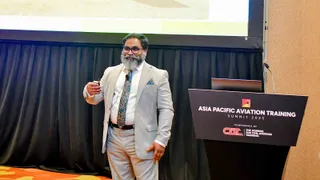Dstl to develop conceptual unmanned aircraft
Contact Our Team
For more information about how Halldale can add value to your marketing and promotional campaigns or to discuss event exhibitor and sponsorship opportunities, contact our team to find out more
The Americas -
holly.foster@halldale.com
Rest of World -
jeremy@halldale.com
A new project to develop a novel unmanned combat aircrafthas been announced by the RAF Rapid Capabilities Office (RCO) and the DefenceScience and Technology Laboratory (Dstl).
The Lightweight Affordable Novel Combat Aircraft (LANCA)concept looks to offer additional capability, deployed alongside fighter jetslike the F-35 and Typhoon – offering increased protection, survivability andinformation for the manned aircraft – and could even provide an unmanned combatair ‘fleet’ in the future.
Specifically, in a break with traditional approaches forcombat air systems in the UK, the innovative LANCA concept aims to deliverdramatic reductions in traditional cost and development timeline.
Under LANCA, a technology demonstrator project known as‘Mosquito’ has awarded contracts for Phase 1 of the work, which will produce apreliminary system design for an unmanned air vehicle and assessment of the keyrisk areas and cost-capability trade-offs for an operational concept. Initialflight test of the demonstrator air vehicle could take place as early as 2022.
Phase 1 will include the exploration of novel design,development, prototyping, manufacture, and support, to enable low-cost rapiddevelopment and evolution of a potential future unmanned combat air system. Dstlis delivering the technical oversight, project management, and partnering forProject Mosquito.
For Phase 1, contracts were awarded to three teams led byBlue Bear Systems Research Ltd, Boeing Defence UK Ltd, and Callen-Lenz (TeamBLACKDAWN partnered with Bombardier Belfast and Northrop Grumman UK Ltd).
LANCA originated in 2015 studies by Dstl to understandinnovative Combat Air technologies and concepts that might offer radicalreductions in cost and development time. Subsequently LANCA was brought intothe RAF RCO as part of the Future Combat Air System Technology Initiative (FCASTI). LANCA aims to explore the utility and feasibility of unmanned capabilityadjuncts to existing and future Fast Jet aircraft, specifically those thatoffer substantial reductions in traditional cost and development timelines.
Project Mosquito has two planned phases. After the 12-monthPhase 1, Phase 2 will select up to two of the Phase 1 solutions to furthermature the designs, complete manufacturing of the technology demonstrator andconclude with a limited flight-test programme.
The RAF RCO, in partnership with Dstl, is adopting creativeapproaches to deliver this challenging project. For example, by conducting acompetition to access ‘best of breed’, it has enabled non-traditional suppliersto propose their approach to meet the MOD’s ambitious aims. Additionally,subject matter experts within the MOD are assigned as technical partners toeach team, supporting industry with technical and operational advice anddecisions. This will enhance the opportunity of this concept in a coherentapproach for future combat air systems.


